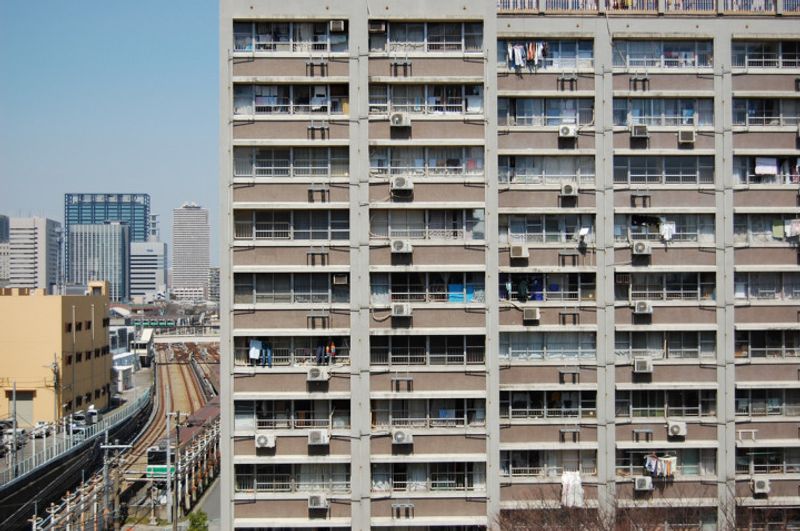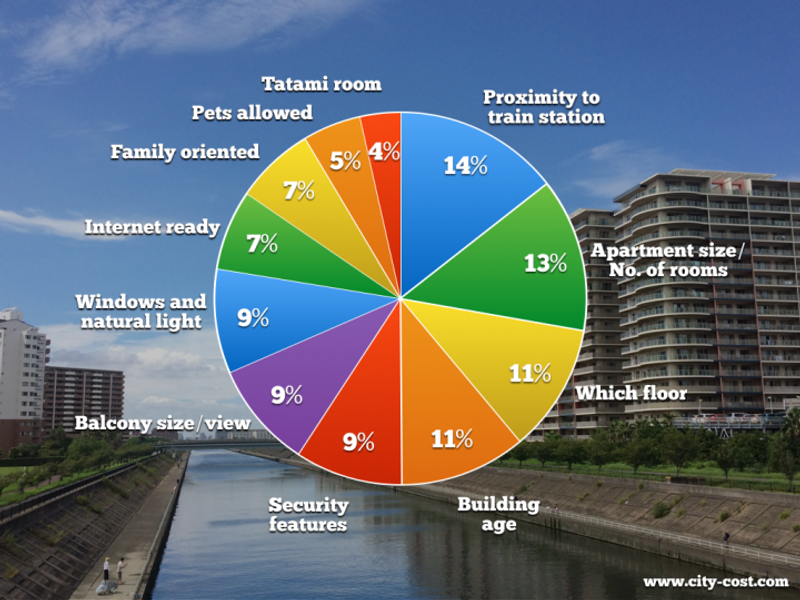Dec 27, 2016
Spoilt for choice? Key factors in choosing an apartment in Japan

For the expat struggling to get to grips with finding and renting an apartment in Japan, getting into the minutia of factors involved in the choice may initially seem a little redundant. The primary occupying concerns are more likely to be, ‘Can I afford it?’, ‘Do I have a convincing salary/job to get my foot in the door?’, and ‘Is the building owner accepting of foreigners?’.
Thankfully, some of these concerns are eroding (slightly), and if we have the support of an employer, partner, or colleague we can start to pay more attention to other factors that commonly influence the choice of our Japanese apartment.
In an earlier post entitled Finding an apartment in Japan: Expats on the challenges and surprises we displayed the ‘stats’ gathered from the City-Cost community regarding the following question: What were the key factors in you choosing your current apartment (or the last apartment you rented) in Japan? In this post we want to take a look at these factors in more detail.
*NB: What follows is our own (or my own) experiences with the factors that have been highlighted. In fact, what this really is, is an insight into why these factors were chosen as those for consideration.

The table below shows a ranking of key factors from the most important to the least.
| 1 | Proximity to a train station | 14.4% |
| 2 | Apartment size/number of rooms | 13.3% |
| 3 | Which floor of the building the unit is/was on | 11.2% |
| 4 | Age of the building | 11.0% |
| 5 | Security features (modern locks, video to the lobby etc) | 9.3% |
| 5 | Condition/size/view from balcony | 9.3% |
| 6 | Windows and natural light | 9.1% |
| 7 | Internet ready | 7.0% |
| 8 | Family oriented building (this can be seen as a positive or negative) | 6.9% |
| 9 | Pets allowed (this can be seen as a positive or negative) | 5% |
| 10 | Tatami room | 3.5% |
1) Proximity to a train station
Would it be fair to say that life in Japan revolves around the train station? Certainly life in urban areas. Here is the hub of everything, most importantly one’s access to the workplace or place of study (usually from high school and above). Rather than illustrious surrounds or fine views, real estate near a train station is about brutal convenience. And it’s catchy. Before moving to Japan I wouldn’t have given a second thought to walking 15 mins for a carton of milk, 30 mins into the town center, or 40 mins to school. The (Japanese) partner won’t do more than 10. For any of these things. And I’m not so keen on it either, now! No, it can’t be emphasized enough; the closer you are to a train station, the easier your life in Japan. Conversely, the harder it will be on your finances. Significantly harder. In finding an apartment in Japan (beyond the concerns mentioned in the opening preamble) proximity to a train station is likely to be the divisive issue commanding of your next choice. Do you measure comfort in terms of abode or in terms of how far you have to walk/cycle to get things done?
To a certain extent, the desire of locals in Japan to be close to a train station reflects perhaps a difference in attitudes to what a ‘home’ is. I’m speculating, but one gets the impression in Japan that a home is really just a place to sleep, eat (maybe), and wash, rather than the kind of ‘fortress’ mentality harboured in other parts of the world. TV often affords us a glimpse into domestic life in Japan and, without wanting to sound like a snob, it doesn’t look like interior design or thoughts of a refurbished kitchen are at the fore.
2) Apartment size/number of rooms
When it comes to apartments in Japan, let’s use the term ‘rooms’ loosely. Better would be to say ‘a space’ or ‘spaces’ divided by sliding doors. In most cases it would also be better to dispel any ideas that ‘rooms’ afford a great deal of privacy. Maybe whoever is in the other ‘room’ can’t see what’s going on, but they can certainly hear it. An example that supports this position is the love hotel, and the sheer abundance of them in Japan. If a couple wants to get intimate and there is a third person (or more) in the apartment (or house even) there’s simply no way this can take place without said parties knowing about it. Pretty explicitly.
Use of the term ‘space’ is also down to most ‘spaces’ not being separated by a corridor or hallway that can add to the sense of privacy.
However, this is to digress. Factoring in the number of rooms an apartment has may simply be down to the number of householders, or a desire for more storage space.
3) Which floor of the building the unit is/was on
One line of thinking behind this relates to Point 6; Windows and natural light. Space is at a premium in urban Japan. If you want the natural light, your chances of getting it increase the higher up the building you go. One can’t be complacent with this either. This year you may have a roof top view and all the light you need to dry that laundry. Next year you could be staring straight into the unit of a building no more than a couple of meters away. No, you haven’t moved, they’ve just thrown up a new building next to yours.
Security is another line. Japan fares well compared to most other nations in terms of crime rate, and you’d have to consider yourself really unlucky to have your apartment broken into. This expat lived next door to a colleague (another expat) who didn’t lock their door for two years. Stupid? Yes! Did they get robbed? No! If Japan does appear at the upper echelons of a crime chart, it could well be the one about cases of missing underwear. It’s not uncommon on these shores to read/hear news pieces about some troubled male caught red handed with underwear (usually female) that they snatched from laundry hanging out to dry. I’ve yet to come across a story where the scene of the crime has been beyond the first (or ground) floor.
Noise pollution is another factor. Urban Japan is noisy whatever angle one approaches it. The ground floor then is likely the most noisy spot. Passing traffic (foot and vehicle) comes in all shapes and sizes here; the drunken workers staggering off the last train, the train itself, politicians armed with megaphones, pickup trucks flaunting their business through loud speakers, school kids going to and from club … it’s an extensive list.
4) Age of the building
Back home an old building often comes with a sense of rustic charm. That’s not really the case in Japan, especially when it comes to places to live. This is best expressed with houses. They aren’t built to last. Once the kids have cleared out, parents (and now grandparents) often have their houses knocked down and rebuilt, usually with room for the kids to return and look after them.
However, I suppose the main factor in offering this as a choice was down to a building's resistance to earthquakes. Since March 2011 a more acute awareness of the potential earthquakes have to cause destruction has likely been acquired by a new generation of expats in Japan.
5) Security features (modern locks, video to the lobby etc)
Maybe this is self explanatory.
6) Windows and natural light
One would be tempted to say that this key factor is self explanatory. Everyone wants their share of natural light for the sake of having natural light, don’t they? Perhaps so, and this was really my line of thinking. In Japan, however, a sense of privacy seems to take precedence. Windows here are often shuttered and curtained up on the finest of days. Of more pressing concern still, to Japanese people, seems to be the drying of laundry and the airing of futon. They even forecast it on weather broadcasts. It’s a reflection of the Japanese homemaker’s quite staggering obsession with doing laundry.
7) Internet ready
Getting the Internet set up can be a pain in any country. Doing in a foreign language even more so. This one speaks for itself.
8) Family oriented building (this can be seen as a positive or negative)
A noise issue really. The large apartment complex across the street from mine is emphatically family orientated. It’s charming and all, but I wouldn’t want to live there. Unless I had kids myself. If ‘rooms’ within a Japanese apartment are poor at sealing in noise, individual apartment units might not be that much better. It depends on construction material, of course, but with open balcony doors straining for a summer breeze, even the heaviest of walls will struggle to keep things completely quiet.
9) Pets allowed
Often in apartment searches ‘pets allowed’ has the nuance of being negotiable rather than a clear OK. It can depend on the type of pet and how many, so you’ll need to double check.
10) Tatami room
In the interests of honesty, and at the risk of causing offence, I listed this as factor for consideration as I personally don’t like them. I just don’t like way tatami flooring dominates a space. It seems to be pushing you into sleeping on a futon and sneering at any ideas you might have had of putting down a rug. You need to let it breath lest you get discoloration and mould. It’s hard enough that you can’t lie in comfort on it, and soft enough that you’re going to damage it with chairs and other furnishings.
Bad news for me then but if an apartment in Japan has more than one ‘room’, there’s a significant chance that one of them will be tatami. If it has more than two, you can all but guarantee it. However, it’s not a deal breaker for me really, and in that regard it seems that others feel much the same.
If there are any other key factors in choosing an apartment in Japan that haven’t been listed here that you feel should, please continue the discussion below and share your ideas.
See us on ...
Twitter: @City_Cost_Japan
Facebook: @citycostjapan
hiromitsu morimoto Flickr License



0 Comments